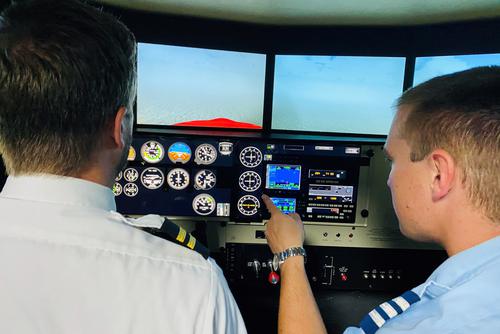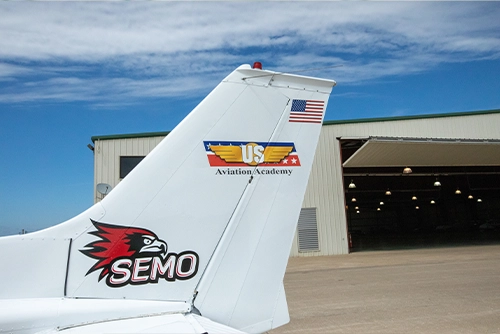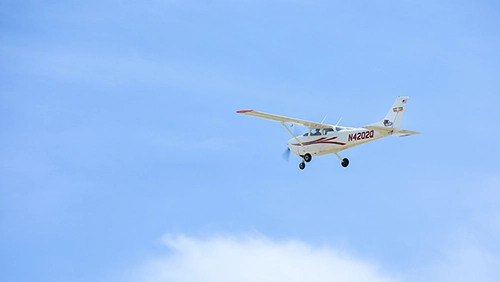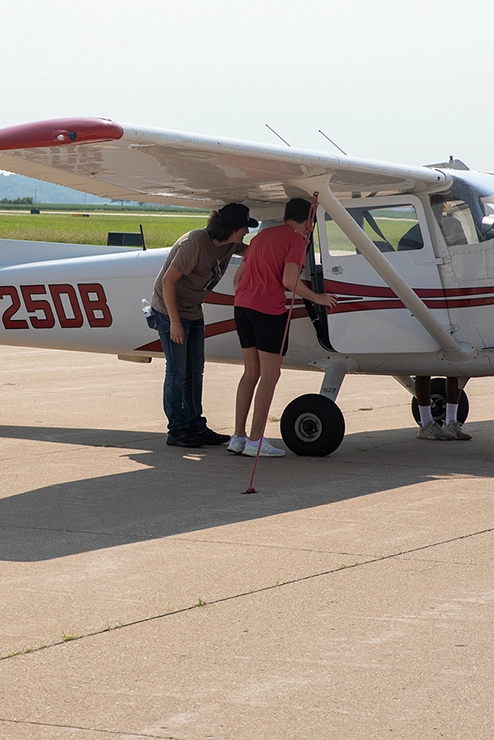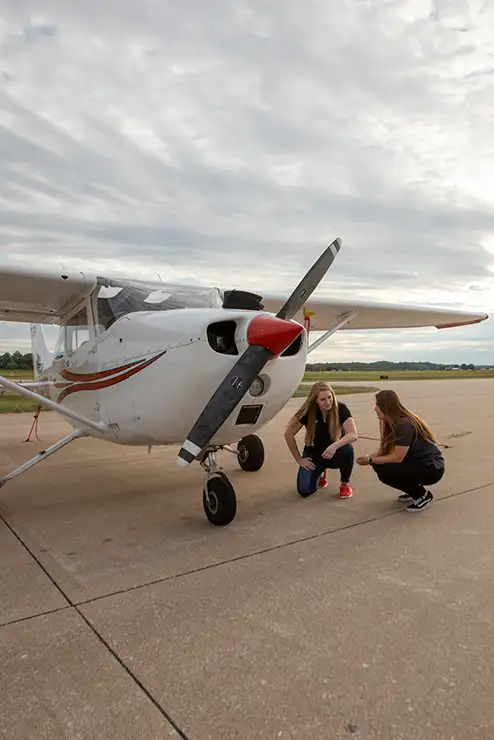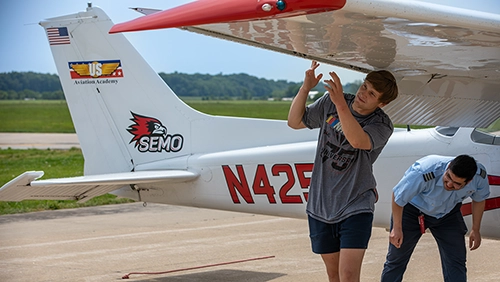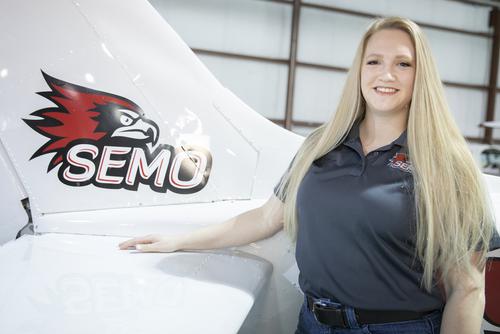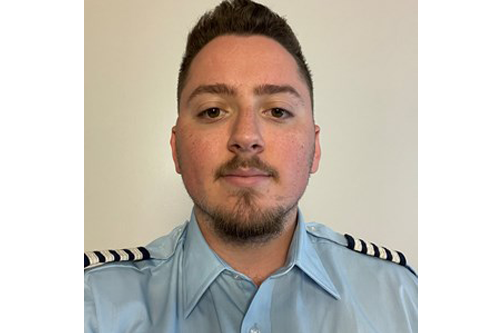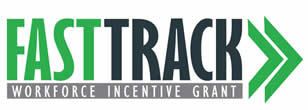Professional Pilot Degree
Continue to main content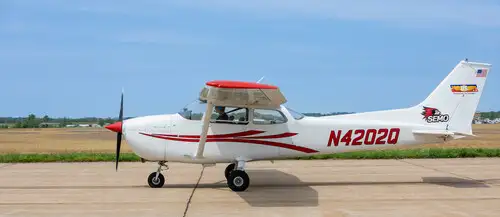
Professional Pilot (BS) Degree Map
Explore the courses you'll need to complete your degree.
Outcomes & Careers
-
$280k
Airline Pilots
According to the U.S. Bureau of Labor Statistics, the median annual pay for airline and commercial pilots is $280,570.
-
5%
Projected Growth
U.S. Bureau of Labor Statistics projected growth for pilots over the next 10 years.
-
152k+
Number of Jobs
U.S. Bureau of Labor Statistics calculated that there were 152,800 Airline and Commercial Pilot positions in 2022.
As professional pilot major, you’re headed for a career of adventure. Students will earn their private pilot, commercial pilot, and flight instructor certifications. You’ll complete a minimum of 120 credit hours to complete this degree, including the general education requirements and at least 39 senior division hours.
Required Courses
- AV100 Introduction to Aviation (2)
- AV110 Private Pilots (3)
- AV111 Private Pilots Lab (3)
- AV210 Aviation Instrumentation (3)
- AV211 Aviation Instrumentation Lab1 (2)
- AV301 Aviation Safety (3)
- AV306 Aviation Management I (3)
- AV310 Commercial Pilot (3)
- AV311 Commercial Pilot Lab1 (1)
- AV312 Commercial Pilot Lab 2 (2)
- AV313 Commercial Pilot Lab 3 (1)
- AV390 Aircraft Design & Performance (3)
- AV395 Advanced Avionics Theory & Operation (3)
- AV406 Aviation Management II (3)
- AV408 Human Factors in Aviation (3)
- AV410 Flight Instructor (3)
- AV411 Flight Instructor Lab1 (2)
- AV412 Flight Instructor Lab 2 (1)
- AV420 Jet Flight Management (3)
- AV430 Crew Resource Management (3)
- AV450 Aviation Capstone (3)
- EN100 English Composition (3)
- ET384 UAS Law and Policy (3)
- GO418 Meteorology (4)
- IM300 Technical Communication (3)
- IM301 Industrial Safety (3)
- IM419 Industrial Supervision (3)
- MA116 Precalculus A (3)
- MN220 Engineering Economic Analysis (3)
Choose 6 Hours:
- AV206 Aviation Weather (3)
- ET380 Vision and Sensor Systems (3)
- ET381 Fundamentals of Flight (3)
Choose 2-3 hours:
- AV440 Multi-Engine Instructor (1)
AND - AV441 Multi-Engine Instructor Lab 1 (1)
OR - IM311 Statistical Process Control (3)
Choose 4-5 hours – Physics:
- PH106/107 Physical Concepts & Lab (3+1)
- PH120/020 Introductory Physics I (5)
Choose 3-5 hours – Chemistry/Geology:
- CH181 Basic Principles of Chemistry (5)
- FN235 Nutrition for Health (3)
- GO110 Physical Geology (3)
Choose 3 hours:
- SC105 Fundamentals of Oral Communication (3)
- SC155 Fundamentals of Interpersonal Communication (3)
Some requirements may be fulfilled by coursework in major program.
- Social and Behavioral Sciences – 6 hours
- Constitution Requirement – 3 hours
- Written Communication – 6 hours
- Oral Communication – 3 hours
- Natural Sciences – 7 hours (from two disciplines, one to include a lab)
- Mathematics – 3 hours
- Humanities & Fine Arts – 9 hours (from at least two disciplines)
- Additional requirements – 5 hours (to include UI100 for native students)
- Civics examination
*Many major courses are on a set rotation and dependent on when prerequisites are completed. The actual semester a course is taken may vary based on the rotation.
First Year
Fall Semester (15 Hours)
- UI100 (1)
- AV100 (2)
- AV110 (3)
- AV111 (3)
- EN100 (3)
- MA116 (3)
Spring Semester (15-16 Hours)
- AV210 (3)
- AV211 (2)
- IM300 (3)
- MN220 (3)
- Physics (4-5)
Second Year
Fall Semester (16 Hours)
- AV206/ET380/ET381 (3)
- AV301 (3)
- AV306 (3)
- AV310 (3)
- AV311 (1)
- IM301 (3)
Spring Semester (14 Hours)
- AV206/ET380/ET381 (3)
- AV312 (2)
- AV406 (3)
- AV410 (3)
- General Education (3)
Third Year
Fall Semester (15 Hours)
- AV313 (3)
- AV395 (3)
- AV408 (3)
- AV411 (2)
- IM419 (3)
- SC105/SC155 (3)
Spring Semester (14-16 Hours)
- AV390 (3)
- AV412 (1)
- ET384 (3)
- GO418 (4)
- Physical Science (3-5)
Fourth Year
Fall Semester (14-15 Hours)
- AV420 (3)
- IM311/AV440 and AV441 (2-3)
- General Education (3)
- General Education (3)
- General Education (3)
Spring Semester (15 Hours)
- AV430 (3)
- AV450 (3)
- General Education (3)
- General Education (3)
- General Education (3)
What will it cost?
Our Aircraft
Southeast’s fleet includes the Cessna 172 M aircraft, which has been used to train more pilots than any other airplane in the history of aviation. The 172 offers enhanced visibility, is easy to fly, and most importantly, is ranked best for safety. Therefore, our students can train both comfortably and successfully.
Additional Features
- Interior overhaul with new seating and paint
- Dual Garmin G5 Instrument Panel
Other Equipment
- Garmin G650 GPS
- Lynx® NGT-9000 ADS-B touchscreen transponder
Our Facilities
Our aviation facilities and training equipment were designed with you in mind!
The Cape Girardeau Regional Airport is owned by the City of Cape Girardeau and will host Southeast’s pilot program fleet and training facilities. Cape Girardeau Regional Airport is a full-service airport with approximately 66 aircrafts based on the field and averaging 80 aircraft operations daily. Operated by SkyWest Airlines, flights are available daily to and from Chicago and Paducah.
Southeast courses at the Cape Girardeau Regional Airport will be taught from a 52,000 square-foot hangar that house private aircraft. The space allows the pilot program both access to the hangar as well as a classroom, offices, and flight simulators.
Cost & Aid
Although Southeast Missouri State University has a proven reputation for keeping tuition costs low while delivering the highest level of quality education, flight training is expensive. It is important that students planning to major in the Professional Pilot program understand that financial planning is vital to successfully completing this degree. Scholarships are available.
“ We're a smaller program, but that also means that we get a little bit more one-on-one time that you wouldn’t get in any other school! A lot of other schools have wait periods and issues with scheduling—especially when they have a large class size and a smaller fleet. Here at SEMO, I've always had the resources I need. ”
Become a Redhawk.
Do more than dream about the future. Take the first steps to make it all happen.
Your Journey to the Skies Starts Here
Meet our World-class Aviation Team
Miranda Sullivan - Director of Aviation
Southeast’s experienced professors provide real-world learning opportunities. Miranda Sullivan brings 7 years of flying experience and says, “At SEMO, we set students up for a professional career in aviation. So whether that be, they want to go to airlines, they want to fly corporately, they maybe want to do some charter stuff, you know, pipeline whatever they want to do. We give them the tools to be successful in those in those areas. So the possibilities are endless.”
Noah Patterson - US Aviation Team Lead
Noah started his aviation path shortly after graduating high school. In 2017, he began working on his private pilot certificate and has since obtained many more certificates and ratings. Noah has always strived to do more in the aviation world by taking on more responsibilities every chance he could. As a leader, Noah acts as a helping hand to instructors and students with flight operations. His role as base manager is to help and monitor student progress as well as maintain a positive relationship with SEMO. Noah is passionate about students progressing towards their goals and ensuring they have the opportunity to do so at SEMO.
Get Funding for Your Education
Missouri’s opened the door to a more educated workforce. We want to help you walk through it. If you’re an adult learner and a Missouri resident returning to college, learn about the Fast Track Workforce Incentive Grant. It’s a statewide financial aid program that can be used to pursue a certificate, degree or industry-recognized credential in a high need area in Missouri. This major is eligible for the Fast Track grant.
Getting the Job
Your education is just one piece to launching an extraordinary career. Once you’ve mastered the material, you still have to find the job you want, make the right connections, and sell your knowledge and experience—if all this is giving you anxiety, don’t panic. SEMO’s Career Services office is here to help you with the next step. Our boldly supportive faculty will provide the expertise and support you need, so you’re landing your dream job in no time.
Cape Girardeau, MO 63701
